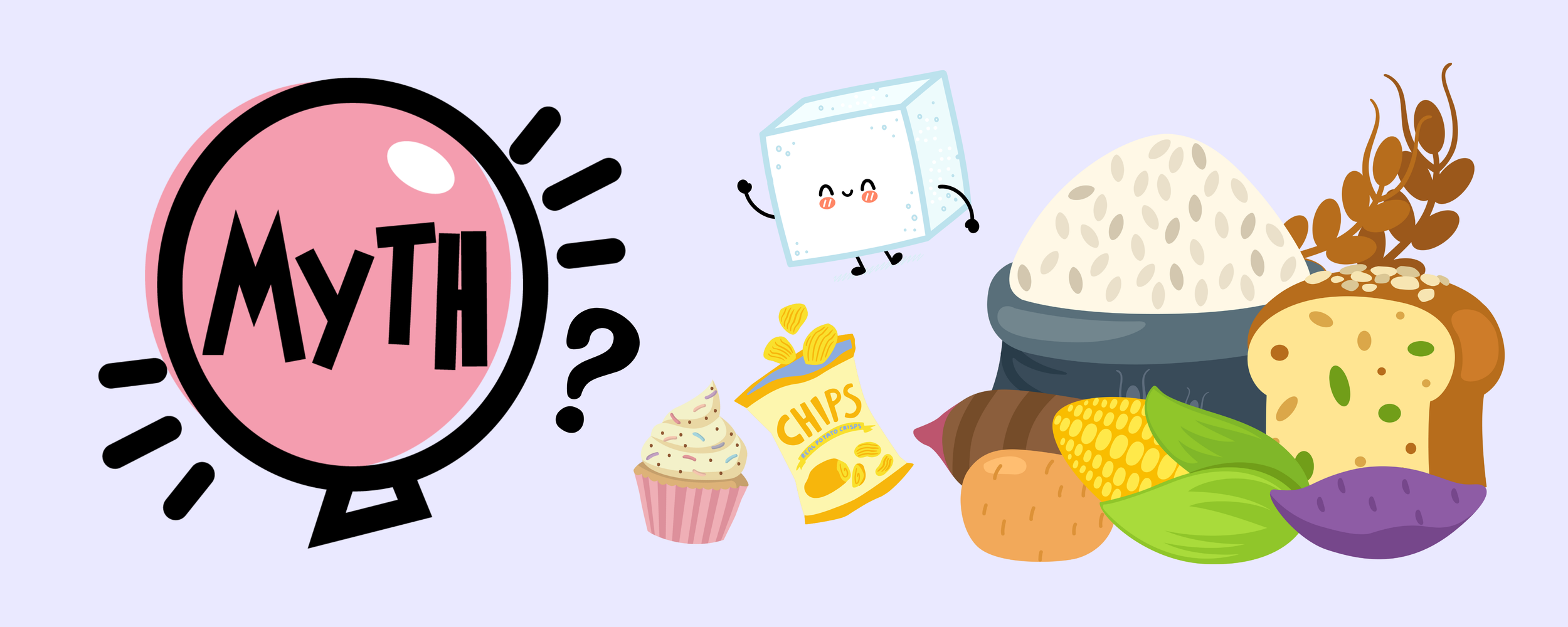Why Carbs Are Not Your Enemy: Debunking Popular Carbohydrate Myths
Picture this: you're scrolling through social media, and your feed is flooded with "low-carb this" and "no-carb that." Friends are swearing off bread, and family members are convinced that pasta is the root of all their health problems. Sound familiar? If you've been wondering "are carbs bad for you?" or "should I cut out carbohydrates?", you're in the right place.
Let's face it - carbohydrates have gotten a pretty bad rap over the years. But here's the truth: your body needs carbs, and declaring them as the enemy isn't just unnecessary - it could be holding you back from a healthier, more balanced relationship with food. As a non-diet dietitian, I'm here to help you understand the real science behind carbohydrates.
The Big Carb Confusion: Common Myths Debunked
"Carbs Make You Gain Weight": This might be the biggest myth of all. The truth? No single nutrient is responsible for weight gain. According to Nutrition Australia, carbohydrates are a crucial part of a balanced diet, providing essential energy for daily activities. Research published in the journal "Nutrients" shows that it's not carbohydrates themselves, but overall energy balance that influences weight management. Carbohydrates are actually your body's preferred energy source, fueling everything from your morning workout to your afternoon brainstorming session.
"All Carbs Are Created Equal": Here's where things get interesting. Not all carbohydrates are the same. While a slice of white bread and a sweet potato are both carbs, they affect your body differently. Dietitians Australia emphasizes that complex carbohydrates (like whole grains, legumes, and vegetables) provide sustained energy and essential nutrients, while simple carbs might give you a quick energy boost followed by a crash. This does not mean that simple carbs must be avoided, but more-so to highlight that the blanket “carbs are the devil” is simply not true.
"Your Brain Doesn't Need Carbs": Spoiler alert: your brain loves carbohydrates! Glucose is the primary energy source for the brain, and maintaining stable blood glucose levels through regular carbohydrate intake is important for optimal cognitive function and mental wellbeing. Trying to concentrate while severely restricting carbs? That brain fog you're experiencing might be your brain asking for its preferred energy source. Nutrition Improvement Centre explains The Effects of Carbohydrates on Brain Function.
Signs You Might Be Under-Eating Carbs
Constant Fatigue: Finding yourself dragging through the day? Your energy levels might be suffering from inadequate carbohydrate intake. Carbs are like fuel for your body's engine - without enough, you might feel like you're running on empty.
Intense Cravings: Those overwhelming urges for bread, pasta, or sweets might actually be your body's way of saying it needs more carbohydrates. Instead of fighting these cravings, try listening to your body and incorporating balanced portions of complex carbs into your meals.
Poor Exercise Performance: If your workouts are feeling harder than usual, or you're hitting the wall faster, low carb intake could be the culprit. Carbs are particularly important for high-intensity exercise and endurance activities.
Practical Tips for Making Peace with Carbs
Focus on Quality: Prioritise more whole grain options, fruits, vegetables, and legumes as your consistent carb sources. These foods not only provide energy but come packed with fibre, vitamins, and minerals your body needs.
Practice Balanced Plating: Instead of eliminating carbs, aim for balance. Try filling ¼ of your plate with complex carbs, ¼ with protein, and the remaining half with colorful vegetables. This approach ensures you're getting a good mix of all nutrients. Want to know how to achieve this concept with everyday meals? This is exactly what I teach in my New Free Guide: The Ultimate Guide to Balanced Meals.
Listen to Your Body: Pay attention to how different carb sources make you feel. Some people feel energized after a bowl of oats, while others might prefer a sweet potato. There's no one-size-fits-all approach.
Timing Matters: Consider when you eat your carbs. Many people find that including carbs around their workouts helps with energy and recovery. Others might prefer having their larger carb portions earlier in the day.
Breaking Free from Carb Fear
Remember, developing a healthy relationship with all foods, including carbohydrates, is key to sustainable nutrition. Instead of viewing carbs as the enemy, try seeing them as what they really are - an important part of a balanced diet that fuels your body and brain whilst supporting your overall wellbeing.
When you stop demonising carbs and start embracing them as part of a balanced eating pattern, you might find yourself feeling more energised, satisfied, and free from the constant worry about this essential nutrient.
For more evidence-based nutrition advice, check out my other articles on emotional eating and intuitive eating.
Want more support on your journey to food freedom? Check out my latest book, THE ANTI DIET METHOD, packed with practical tools and strategies to help you break free from restrictive eating patterns and build a healthier relationship with all foods, including carbs.
Looking for balanced meal ideas that include nourishing carbohydrates? Don't forget to grab my FREE Recipe Ebook, featuring 30 delicious, balanced meals that will help you fuel your body and satisfy your taste buds!



